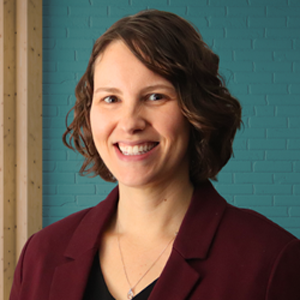In the heart of Parkdale, a diverse neighbourhood west of downtown Toronto, the Church of Epiphany and St. Mark is taking steps to help its neighbours find healthy, affordable food. The goal is one the parish sees as a natural fit. “The biblical story begins in the garden and ends in a feast,” says the Rev. Dr. Jason McKinney, associate priest-missioner to the Parkdale Community Food Hub. “Food is central to the ministry of Jesus. Food is central to the ongoing sacramental presence of Jesus within the people of God today.”
The idea of hosting a food hub in the church surfaced in early 2013 when the Jeremiah Community, a new monastic Anglican group, found a home in the church building. “Members of the community were looking around the neighbourhood trying to find places to connect,” says Mr. McKinney. The church had recently lost its daycare tenant, and local leaders wondered if it could offer space where food could be distributed to residents. “Parkdale remains a relatively affordable neighbourhood by city standards, but the pressure of gentrification is increasing,” says Mr. McKinney. “We’re concerned that healthy, culturally appropriate food will become more and more unaffordable.”
The church’s location at the heart of Parkdale makes it an ideal gathering space. With the Milky Way Garden just behind it, a park and community centre across the street and a public library next door, the church is positioned at the centre of a neighbourhood actively talking about what its future could look like. “Where the church sits, it can either be in the way of a lot of this grassroots momentum toward a more equitable, diverse and inclusive neighbourhood, or it can be an enabler of that,” says Mr. McKinney.
The food hub idea didn’t take root immediately, but the church continued to make connections with local organizations concerned about development in Parkdale. Meanwhile, a neighbourhood-wide planning study identified health and food security as an area of interest, and the idea of a community food hub re-emerged. “It became an idea of multiple organizations collaborating, ideally in a single space, by sharing resources and trying to think about creative solutions to food insecurity,” says Mr. McKinney.
The focus has also shifted to food security, rather than emergency food relief. “It takes into account the whole of the food system, beginning with the planting and growing of food all the way through processing, producing, harvesting, all the way to the table,” he says. “How do we make sure the system guarantees that people don’t find themselves in a situation where they need emergency food relief?”
While many models for food hubs exist, the concept in Parkdale is being driven largely by the church’s existing facilities. The building has two industrial kitchens, one of which is already set up as a space different groups can use to host food literacy programs. “It would offer programs that would teach young kids how to cook, for instance, which is happening now,” says Mr. McKinney.
Members of the church hope its other kitchen can be upgraded to accommodate a food production or food processing centre, which would connect with the Milky Way urban agriculture site just outside the building. “One of the things we’re looking at is increasing the production capacity of the garden and, if bylaws and zoning allows, creating a market garden so food can be sold,” he says. “This is a part of a longer-term vision of the food system in Parkdale where food is grown, processed and consumed or sold in the same square block.”
Plans for the food hub are still in their early stages, but the community of Epiphany and St. Mark will continue to advocate for its success as a member of the project’s steering community of neighbourhood partners. “Food has been identified by the neighbourhood as a need, and the church is in a position to contribute something towards that,” says Mr. McKinney. “I would say that the Holy Spirit is doing something in the neighbourhood.”



Lament starts grief journey